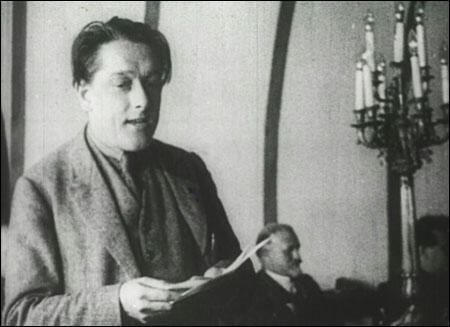Willi Münzenberg
Willi Münzenberg was born in Germany in 1889. Münzenberg became interested in social problems and at the age of seventeen joined the Social Democratic Party. Soon afterwards he moved to Switzerland where he came into contact with exiled revolutionary groups such as the Bolsheviks. He met Lenin and after that became his devoted follower. Münzenberg was eventually arrested and deported from the country for being an undesirable foreigner.
Münzenberg opposed the First World War joined with a group of radicals that survived the failed German Revolution to form the German Communist Party (KPD). Rose Levine-Meyer met Münzenberg in 1919: "Münzenberg was short, slender and boyish looking, but bristling with energy and the self confidence of a man who knows his own powers... He came to hold a meeting in the nearby industrial town (Schwenningen) embracing some 10,000 well organized workers, chiefly members of the SPD and USPD... Our friendship came to an end... when Münzenberg suddenly severed all his former political affiliations and went over to the so-called untra-left. It is true that he was by no means the only leader who went that way. A few genuinely believed in the promises of quick results: the revolution was allegedly around the corner."
The Communit Party's first congress was addressed by Gregory Zinoviev, the Russian Bolshevik and head of the Comintern. Throughout the 1920s Münzenberg and the KPD was very much under the influence of Communist Party of the Soviet Union. In 1921 Münzenberg founded the International Worker's Relief in Germany, an organization that raised money for people in Russia suffering from the great famine.
Münzenberg became one of the leaders of the KPD, now the largest Communist Party outside the Soviet Union and was fairly successful in elections to the Reichstag: 62 (May, 1924), 45 (December, 1924), 54 (May, 1928), 77 (September, 1930), 89 (July, 1932) and 100 (November, 1932).

After the Reichstag Fire on 27th February, 1933, Hermann Goering and the Nazi Party launched a wave of violence against members of the German Communist Party and other left-wing opponents of the regime. Some of the party's leaders such as Ernst Thalmann were arrested but Münzenberg managed to escape and went to live in France
Willie Münzenberg broke with the Soviet Union as a result of the signing of the Nazi-Soviet Pact and now became an outspoken critic of Joseph Stalin. After the invasion of France by the German Army Münzenberg was interned in Lyon as an anti-fascist. Münzenberg was murdered by agents of the NKVD in 1940.
Leopold Trepper later explained: "In 1940, he had been imprisoned by the Daladier government in the camp for foreigners at Gurs. It was there that two agents of Beria, fellow prisoners of his, were given the job of executing him. The two men proposed that he escape with them. Only too happy to take advantage of the opportunity, he agreed. He was found hanged two hundred yards from the camp."
Primary Sources
(1) Rose Levine-Meyer, the widow of Eugen Levine, wrote about Willie Münzenberg in her book Inside German Communism (1977)
I first met Willie Münzenberg in the summer of 1919, while recuperating in a Black Forest spa from an illness after Munich. He came to hold a meeting in the nearby industrial town (Schwenningen) embracing some 10,000 well organized workers, chiefly members of the SPD and USPD.
Muzenberg was short, slender and boyish looking, but bristling with energy and the self confidence of a man who knows his own powers. He considered me first of all for my publicity value. We had hardly exchanged a few words before he exclaimed excitedly: "I will announce on the posters that the widow of Eugen Levine will be in the audience."
He planned a tour all over the country, which he believed could be extended outside Germany, with me as the star attraction. He thought it all out: "What a sensation! We might even be invited to America - we could become world famous celebrities."Of course, the great orator did not need my help. My presence was only to serve as a living monument to a tragic event.
Our friendship came to an end around 1924, when Muzenberg suddenly severed all his former political affiliations and went over to the so-called untra-left. It is true that he was by no means the only leader who went that way. a few genuinely believed in the promises of quick results: the revolution was allegedly around the corner.
(2) Leopold Trepper, head of the Soviet Union backed group, Red Orchestra, wrote about the death of Willie Muzenberg in his memoirs, The Great Game (1977)
Willie Münzenberg had been removed from the staff of the German Communist Party and the Communist International in 1937. In 1940, he had been imprisoned by the Daladier government in the camp for foreigners at Gurs. It was there that two agents of Beria, fellow prisoners of his, were given the job of executing him. The two men proposed that he escape with them. Only too happy to take advantage of the opportunity, he agreed. He was found hanged two hundred yards from the camp.

